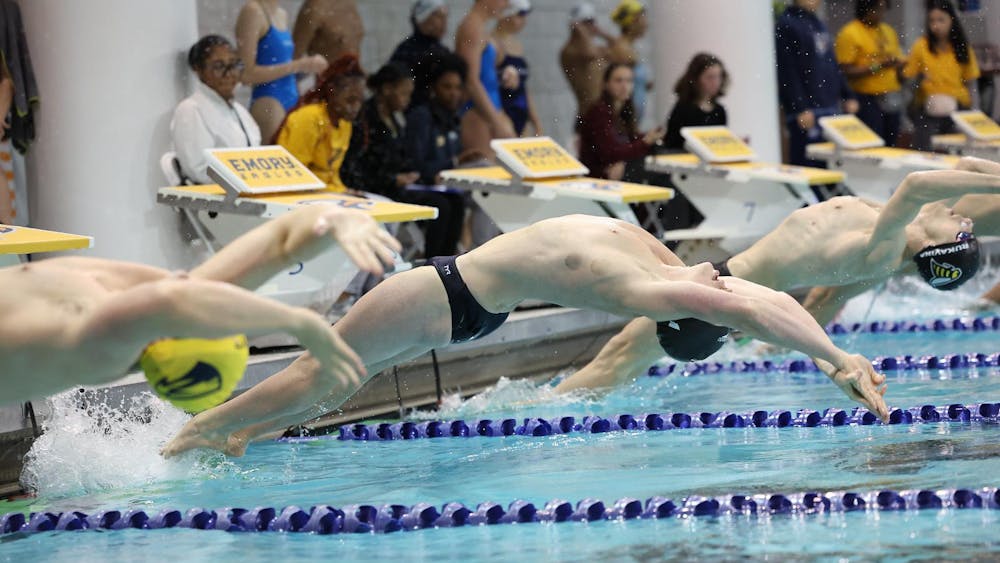The men's basketball team dominated on Saturday night en route to a 70-48 win over the Rhodes College (Tenn.) Lynx. The Eagles improved to 5-2 on the season with the victory.
"It's always great to get another one in the left column," senior guard Alex Greven said. "It's important to bounce back from a loss with a win to get momentum moving in the right direction."
Emory's tough defense led the way early, holding Rhodes to just 21.7 percent (five of 23) from the floor in the first half.
With 14 minutes left in the first half, Emory was trailing 11-10 when Greven hit a three-pointer to give the team its first lead of the game. They would not trail again.
It was Greven's only bucket of the first half, but he made it count. Emory ripped off a 19-2 run after the three-pointer, which gave them a comfortable 27-13 cushion at halftime.
The Eagles did not allow the Lynx to score a single point in the last nine minutes of the half while they pulled away with big shots from junior forward Jake Davis, senior guard Nash Oh and sophomore guard Josh Schattie.
Head Coach Jason Zimmerman was pleased with his team's defensive effort but saw room for improvement on the offensive end, where the Eagles struggled to find a rhythm early.
"We played tough on defense ... but we only scored 27 points in the first half," Zimmerman said. "That doesn't usually happen."
The Eagles came out firing in the second half.
Two three-pointers each from Greven, Davis, and sophomore guard Michael Florin helped the Eagles stave off an early Rhodes run and stretch their lead to 21 points with seven minutes left in the game.
The Lynx would never seriously threaten again, as the Eagles cruised to a 22-point victory.
Emory's performance from beyond the arc was key in the win, as the team nailed a season-high 56.3 percent (nine of 16) from long distance.
"We made some big shots, and when you make one you start thinking the next one can go in," Zimmerman said.
After heating up in the second half, Emory finished at 46 percent from the field compared to 37.3 for Rhodes. It was the third time on the season that the Eagles held their opponent to less than 40 percent shooting.
It amounted to the lowest point total Emory has given up since holding the University of Chicago to 44 in early 2010.
"We pride ourselves in our defense," Greven said. "It's part of our identity. We defend, attack, and value the ball."
Zimmerman credited his team's heads-up style of play.
"We were playing aware," Zimmerman said. "It's better to play aware than to play smart."
Davis led the team in both points and rebounds on the night with 17 and nine, respectively.
The junior's dominance on the boards helped Emory to a 32-22 advantage in rebounds.
Greven finished second on the team in points with 15, including four buckets from long range.
Twelve of his points came in the second half.
Senior forward Michael Friedberg contributed eight points, while junior guard McPherson Moore added six.
Also contributing from behind the three-point arc were freshman guard Davis Rao, sophomore forward Alex Foster, and freshman forward Will Trawick.
The Eagles finished the game with a decided edge at the free-throw line, sinking 93.7 percent as opposed to 60 percent for Rhodes.
Only a month remains until the Eagles play their first University Athletic Association (UAA) opponent. Despite the impressive early record, the players stressed that improvement was necessary before they hit the teeth of their schedule.
"We need to improve on everything, particularly being able to push through mental and physical fatigue," Greven said. "That's how you win games in the UAA."
Zimmerman emphasized a simpler approach.
"Right now we're just worried about the next game," he said.
That game will take place Wednesday, Dec. 5 when the Eagles take on Oglethorpe University at 8 p.m.
– By Ryan Smith





